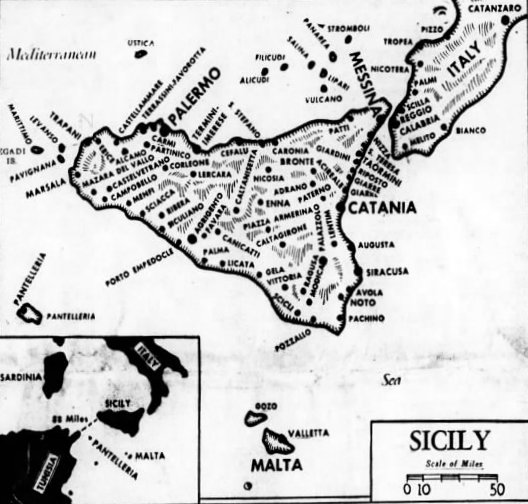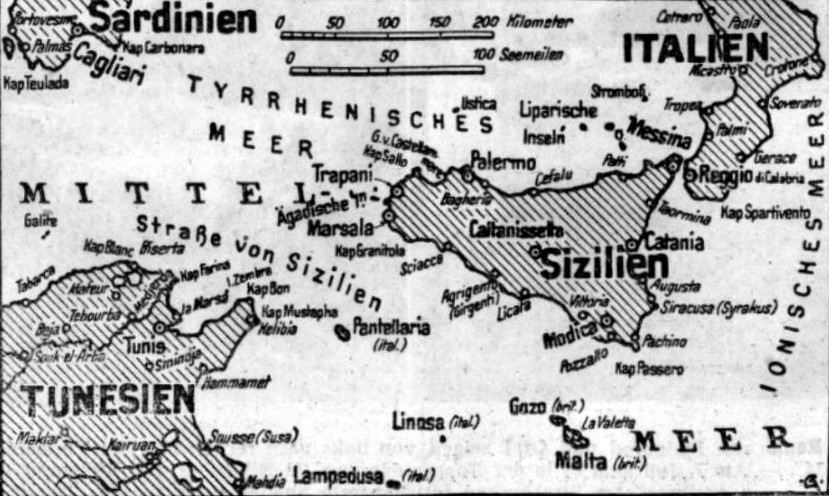Brooklyn Eagle (July 13, 1943)
Allies take Augusta, land near Catania
Sicilian naval base, 3 rail towns seized
The road to Rome

In a series of lightning moves, Allied forces captured the Italian naval base of Augusta and seized the railroad towns of Ragusa, Palazzolo and Floridia. Further north at Catania, British troops landed on the beach.
Allied HQ, North Africa (UP) –
Allied armed forces sweeping across southeastern Sicily have captured the vital Italian naval base of Augusta, pushed 25 miles inland to seize the railroad towns of Floridia, Palazzolo and Ragusa and landed British assault troops on the beaches near Catania.
The swift offensive blows of U.S., British and Canadian troops, backed by a spreading aerial assault and a naval bombardment of Augusta, extended the Allied base for drives northward toward Messina and north westward toward Caltanissetta despite renewed Axis counterattacks.
The expected major enemy counterblows had still failed to develop although resistance was stiffening and the Americans were engaged in hard fighting on the south coast.
Augusta was captured with slight losses, according to a headquarters announcement.
U.S. and British-Canadian forces made a junction at Ragusa following the capture of Floridia and Palazzolo, which lies 25 miles inland from the east coast bridgehead.
The capture of Augusta gave the Allies one of the finest naval bases in the Mediterranean, dominating the sea and land approaches to Catania and Messina, while the old walled town of Ragusa commands important roads and railroads in the southeast.
Radio Algiers estimated the Allies had occupied 310 square miles of territory in Ragusa and Augusta.
The harbor installations at Augusta were reported intact, indicating the Italians had not had time or inclination to Sicily prior to the capture of carry out a scorched earth policy.
The thrust to Palazzolo and Ragusa completed an Allied line across the southeastern tip of Sicily, probably trapping large number of Axis soldiers. The strategy indicated was to cut off the entire sector for use as a base from which land and air forces would strike northward toward Catania and northwestward toward Caltanissetta. It would also give the Allies elbow room for maneuvering against any major Axis counteroffensive, which may be delayed because of fear of new Allied landings at other points in Sicily.
General among captives
Gen. Achille d’Havet, commander of the Italian 206th Coastal Division, was captured along with many prisoners, in addition to around 6,000 previously reported taken by the Allies.
Many counterattacks were repulsed, especially by the Americans in hard fighting near Gela, and enemy tanks (all of French origin) were destroyed.
The Italian Navy, except for submarines, had not yet been encountered in any strength and the Germans, for the moment, showed no definite signs of deciding where to throw the bulk of their armor in Sicily.
Montgomery does it again
The most sensational advance inland was made by the British and Canadians from the Syracuse bridgehead on the east coast. It was directed by Gen. Sir Bernard L. Montgomery.
The Canadians charged along the road to Ragusa with great speed to make a junction with the Americans who had broken through stiff opposition on the south coast.
The Canadians had covered about 45 miles by road from the east coast area in order to reach Ragusa, while the Americans had advanced at least 20 miles although their starting point was not immediately known.
Ragusa is in the mountains at an elevation of 1,680 feet. Little opposition was offered along the winding roads leading to the town, according to preliminary indications. The communiqué said:
The naval operations, in which more than 3,000 shipping vessels and craft of all types, warships and merchantmen are taking part, are proceeding satisfactorily.
Swedish dispatches quoted German reports that the Allies had landed seven infantry divisions – normally 105,000 men – and two tank divisions in the first two days of the invasion. One tank division was identified as American and the other as British.
A Stockholm dispatch said the Italian press has begun to prepare the nation for the eventual loss of Sicily and Radio Morocco asserted that serious anti-war demonstrations have broken out in northern Italy.
Four Italian generals have been killed in the Sicilian fighting, Radio Algiers said, quoting reports from Rome.
The broadcast came soon after Radio Rome announced the first death of an Italian general in action on the island. He was identified as Lt. Gen. Enrico Francisci, commander of the 13th Zone of Blackshirts and general liaison officer of the Sicilian command.
Radio Algiers did not identify any of the generals by name.
Axis prisoners ragged, belongings lost in fight
Advanced base, North Africa (UP) – (July 12, delayed)
The first batch of Axis prisoners captured in Sicily – 1,000 ragged, poorly dressed and weary Italians and four Germans – arrived today under guard of U.S. soldiers.
The Italians, principally from coastal defense divisions which are apparently far from the cream of Mussolini’s army, had little to say and mostly gazed vacantly at the North African landscape.
These Axis soldiers were seized so quickly they didn’t have time to get together any personal belongings. A few had musical instruments.
Montgomery prefers walking to elevator ride
London, England (UP) –
Gen. Sir Bernard L. Montgomery made history throughout his recent stay at the Claridge Hotel by refusing to use the elevator because:
It’s better exercise to walk.
Gen. Montgomery flew to London in May. His trip was kept officially secret to keep the Axis sweating over the whereabouts of the famous British 8th Army and its commander. Despite the attempted secrecy, the man in battle garb and black beret was recognized by thousands of persons.
By remote control
By the United Press
Premier Mussolini, according to Radio Rome, has sent the following message to his forces in Sicily:
I am with you in spirit.
It was recalled today that in August 1937, Premier Mussolini said in a speech in Sicily:
Not one enemy soldier will ever land in Sicily.



